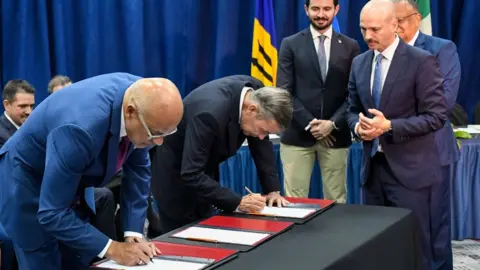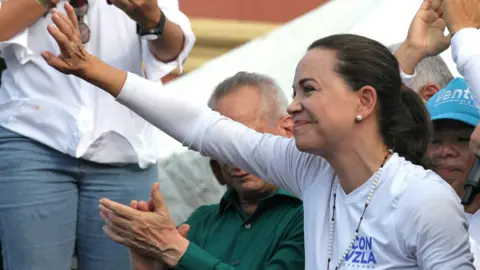Venezuela takes step towards recognised elections
 Getty Images
Getty ImagesVenezuelan government officials and representatives of the opposition have signed an agreement which lays some of the groundwork for presidential elections that will be recognised by both sides to be held.
The government agreed to invite international observers to monitor the election, which has been scheduled for the second half of 2024.
The 2018 election had been widely dismissed as neither free nor fair.
The deal was signed in Barbados.
The agreement constitutes a rare breakthrough after a 11-month hiatus during which talks had stalled.
But analysts point out that it fails to address many of the issues which the opposition had been pushing to have resolved.
There is no mention of a release of political prisoners or the lifting of a ban on a number of opposition candidates vying to run in the 2024 election.
In a joint statement, the US, the EU, Canada and the UK welcomed the agreement, which they described as a "necessary step in the continuation of an inclusive dialogue process and the restoration of democracy in Venezuela".
But in an indication of the work still ahead, the statement also called for "the unconditional release of all those unjustly detained, the independence of the electoral process and judicial institutions, freedom of expression including for members of the press, and respect for human and political rights".
The agreement signed on Tuesday contains 12 points, which include promises to give all candidates access to public and private media, and to guarantee their free and safe movement throughout the country.
The two sides have also agreed to update the voter registries, both inside and outside of the country, in order to ensure that the millions of Venezuelans who have emigrated can exercise their right to vote.
But one point, which concerns the eligibility of candidates to stand for the presidency, already appears to have caused disagreement.
The document says that "the registration for the presidential election will be open to all candidates who meet the constitutional requirements".
The head of the opposition delegation, Gerardo Blyde, said that it could open the door for opposition candidates who have been barred from holding office to "recover their rights".
But the leader of the government delegation, Jorge Rodríguez, appeared to contradict him, stating that candidates who had been barred from running by the comptroller-general would not be able to stand in the 2024 election.
The issue is particularly contentious because a number of popular opposition figures have had bans slapped on them by the comptroller-general, who is a close ally of President Maduro.
Among them is María Corina Machado, who is thought to be the favourite to win Sunday's primary to choose a unified candidate to represent the opposition in the 2024 election.
 Getty Images
Getty ImagesThe 56-year-old former lawmaker has refused to drop out of the race, arguing that if she is chosen as the unity opposition candidate on Sunday, the Maduro government will eventually have to bow to pressure to lift the ban on her.
The government has not yet officially announced who will be its candidate but Mr Maduro is widely expected to run for another term.
The Maduro government is hoping that Tuesday's deal will lead to an easing of US sanctions, which were ramped up following his 2018 election win, which the US has described as "illegitimate".
The US has a vested interest in the crisis in Venezuela easing as the dire state of the economy in the Andean country has driven more than seven million Venezuelans to emigrate, with many heading to the United States.
Venezuela also has the world's largest proven oil reserves and a scaling back of US sanctions on Venezuela's oil industry would benefit both countries economically.
